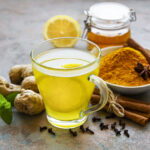6 powerful health benefits of drinking turmeric tea
 (NaturalHealth365) Natural healers have long been aware of the healing powers of turmeric, the ingredient that gives curry its piquant taste and bright yellow color. This South Asian spice has long been valued in the Ayurvedic and traditional Chinese medicine systems for its therapeutic and anti-inflammatory effects.
(NaturalHealth365) Natural healers have long been aware of the healing powers of turmeric, the ingredient that gives curry its piquant taste and bright yellow color. This South Asian spice has long been valued in the Ayurvedic and traditional Chinese medicine systems for its therapeutic and anti-inflammatory effects.
With extensive medical studies supporting turmeric’s ability to combat many serious health concerns – including cancer and heart disease – this ancient remedy impresses modern-day scientists regularly. Let’s take a closer look at why this is happening.
Curcumin in turmeric has powerful protective effects
Turmeric, derived from the roots of a plant scientifically known as Curcuma longa, gets its disease-fighting powers from its curcumin content – a bright yellow flavonoid.
With potent antioxidant and anti-inflammatory capabilities, curcumin prevents oxidative damage to tissues and cells by scavenging harmful free radicals in the body. It also regulates cytokines and enzymes that trigger inflammation – which is at the root of many diseases, including cancer, heart disease, arthritis, asthma, COPD, and pulmonary fibrosis.
In addition, curcumin is strongly antifungal, antibacterial, and antiviral.
Curcumin helps alleviate serious pulmonary conditions
In a review in Pharmacological Research, researchers reported that curcumin might help with asthma, cystic fibrosis, chronic obstructive pulmonary disease, and even lung cancer.
In addition, curcumin has anti-fibrotic effects, preventing or blocking tissue scarring – making it a valuable weapon against diseases such as pulmonary fibrosis.
The authors cited a controlled trial in which short-term curcumin supplementation improved the severity and frequency of COPD symptoms – and highlighted some of curcumin’s beneficial effects. These include inhibiting mast cells, blocking histamine release, and decreasing levels of the pro-inflammatory chemicals COX-2 and 5-LOX.
The authors also reported that dietary curcumin was found to be effective in ameliorating pulmonary function in a study involving over 2,400 patients.
Curcumin targets cancer cells at virtually every stage of growth
Here’s the good news: By interfering with cancer cell survival, proliferation, invasion, and angiogenesis (the growth of new blood vessels to nourish tumors), curcumin helps to effectively “slam the door” on cancer at the cellular level.
In a review published in Nutrients, researchers pointed to animal studies showing that curcumin inhibits tumor growth and weight.
They reported that the flavonoid works against pancreatic cancer by decreasing oxidative stress, interfering with angiogenesis, and inducing apoptosis or programmed cancer cell death. Yet another protective effect is curcumin’s ability to down-regulate levels of MMPs, or matrix metalloproteases – chemicals that make it easier for cancer cells to invade surrounding tissue.
In other studies, curcumin increased the effectiveness of gemcitabine, a pharmaceutical drug given to pancreatic cancer patients. Curcumin has shown particularly promising results when it comes to treating cancers of the prostate, pancreas, breast, skin, and colon.
Heart-healthy turmeric tea may help fight cardiovascular disease
As a powerful antioxidant and anti-inflammatory agent, curcumin in turmeric can play a role in fighting heart disease.
In addition to neutralizing harmful free radicals, curcumin helps maintain healthy levels of the antioxidant enzymes superoxide dismutase and glutathione peroxidase – two “heavy hitters” in the body’s natural defenses.
It also reduces blood pressure and increases the production of beneficial nitric oxide. By reducing the “stickiness” of blood platelets, turmeric may work against atherosclerosis and cut the risk of heart attack and stroke.
In a review published in 2012 in The American Journal of Cardiology, the authors reported that 4 grams of curcumin 3 days before and 5 days after coronary artery bypass grafting surgery reduced the risk of heart attack by 17 percent.
Finally, curcumin-rich turmeric tea may help decrease LDL cholesterol while boosting HDL.
In one study, 500 mg of curcumin for 7 days showed a 29 percent increase in HDL cholesterol and a 12 percent decrease in total cholesterol – a significant improvement.
How turmeric offers value for many other chronic (unwanted) conditions
Curcumin’s potent anti-inflammatory effects may help treat painful osteoarthritis. When used in an Ayurvedic formula – along with winter cherry, Boswellia, and zinc – curcumin caused patients to have less pain and disability.
Turmeric tea may also help with digestion – reducing symptoms of bloating and gas while increasing the production of bile by the gallbladder.
And turmeric tea may even help prevent neurodegenerative conditions.
India has one of the lowest rates of Alzheimer’s disease in the world – along with high consumption of curry. Researchers believe that curcumin blocks beta-amyloid formation, the protein commonly associated with Alzheimer’s disease.
How can I take turmeric as a tea?
You can brew turmeric tea from a powder or grate it fresh from turmeric root. Turmeric tea aficionados typically add 1 to 2 teaspoons of grated or ground turmeric to four cups of boiling water.
Let the liquid simmer for 10 minutes, then strain and cool.
For some, turmeric tea is an acquired taste. If you find it unpalatable, you can sweeten the beverage with organic honey to make it more palatable. Lemon, lime, and ginger can also go a long way towards improving the taste while adding antioxidant value.
As curcumin in turmeric requires fats to dissolve, you could mix it in a tablespoon of coconut oil or almond milk for maximum benefit. Sprinkling in some black pepper also promotes the absorption of curcumin.
It’s hard to think of a body system or organ that turmeric doesn’t benefit. Sipping turmeric tea may very well be one of the most important things you can do to prevent serious disease and maintain optimal health. (Enjoy!)
Sources for this article include:
NIH.gov
Huffingtonpost.com
MedicalNewsToday.com
ScienceDirect.com
ScienceDirect.com



